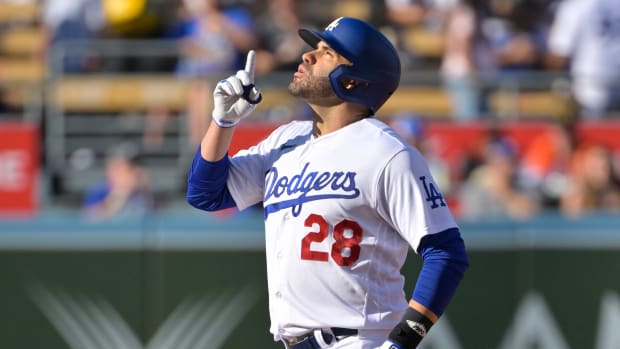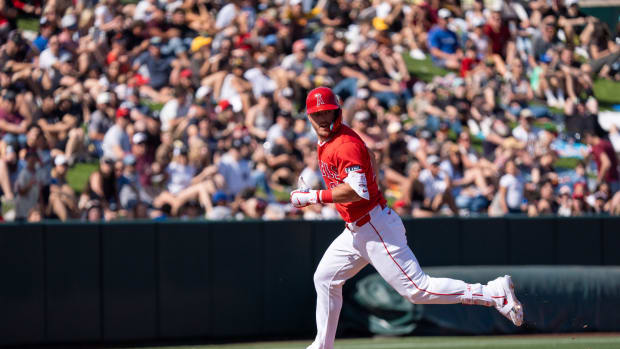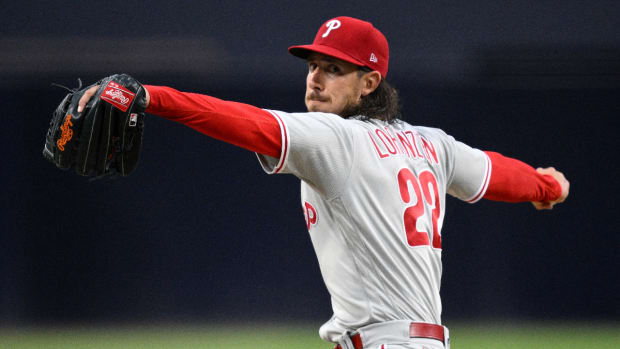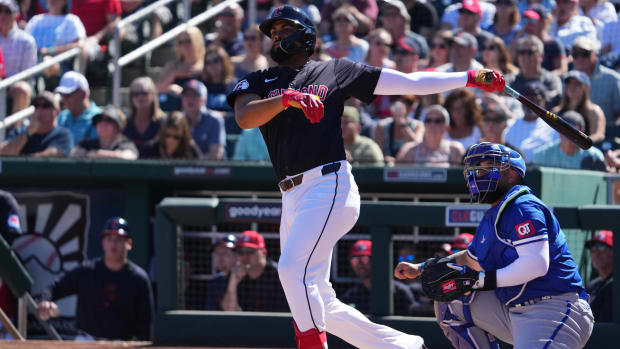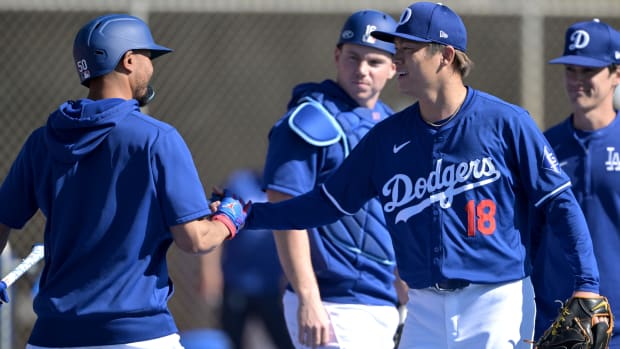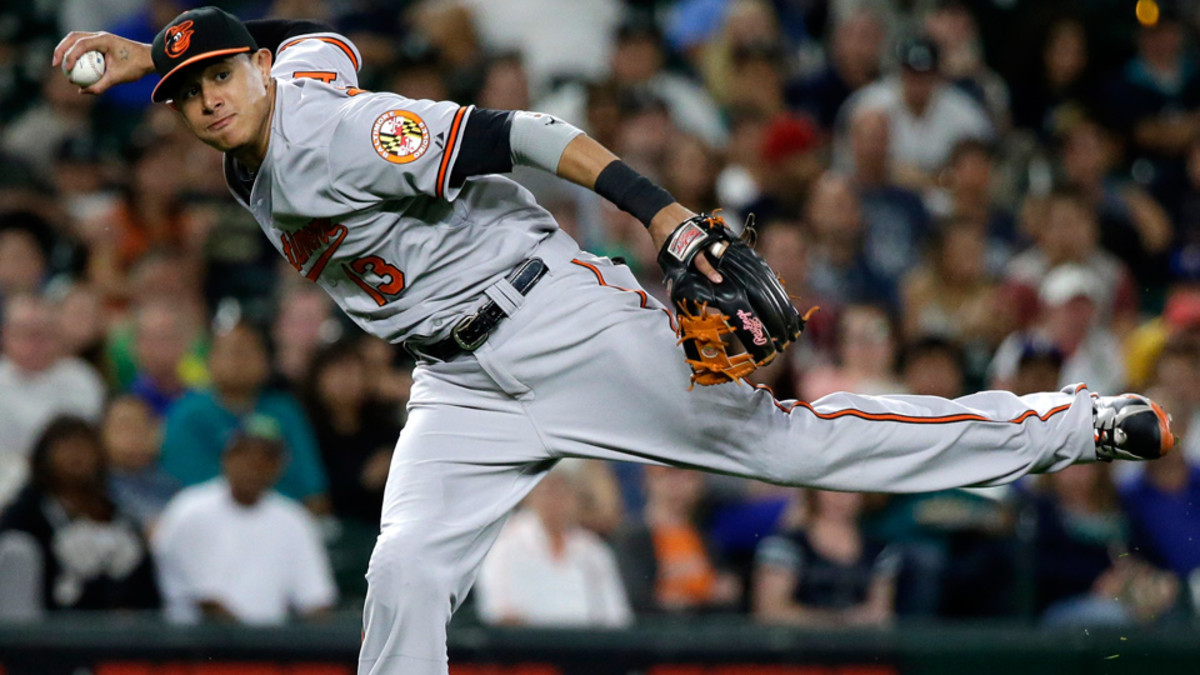
Manny Machado dazzling, starring at 3B—and he's still getting used to it
At 6’3”, Manny Machado is not a small person—if he were, he would likely still be a shortstop—but in the field he is quick and loose, rangy in every sense. He plays deeper than most third basemen can get away with, expanding his territory and compensating with his speed and his rifle of an arm. Sometimes he seems to be in motion before the pitch has even been hit, as if he and the ball had made plans earlier to meet up. He tries to keep his face impassive but, after an especially nifty out, you can make out a small smile hovering at the corners of his mouth. He is in his fourth major league season—and he turned 23 on July 6.
“Every once in a while,” says Orioles manager Buck Showalter, “I do remind myself that he’s a college junior or senior right now. I’ll mention an actor or a singer or something and he’ll give me this kind of look—and I go, Right, he has no idea who Frank Sinatra is.”
Amid offensive slump, Yankees' running game grinds to a halt
Opinions vary on what qualities, precisely, make Machado such a great defensive third baseman. Showalter, who lights up like a bank of halide bulbs at the mention of Machado’s name, likes to talk about his young star’s “clock,” his timing and his “arm speed”; third base coach Bobby Dickerson, who is a longtime infield instructor, first says it’s his hand-eye coordination (“as good as any I’ve ever seen”) but then decides that “the thing that really made him a top-level performer there is his feet. His feet work great. He sees the hop he wants to catch and he’s able to move his feet to find that hop.”
“His accuracy is what amazes me,” says centerfielder Adam Jones.
“His ability to throw on the run...,” chimes in shortstop J.J. Hardy.
“At all different angles,” adds Jones.
“Yeah, all different angles,” says Hardy. “That’s what’s crazy to me.”
For his part, Machado says that playing third is “all about vision—the type of vision you have and how fast you can read the ball.” Even as a kid, growing up in south Florida, he says he always worked to hone his defense: “Always had a glove in my hand, throwing the ball against the wall. You just get better at it with repetition.”
Nolan Arenado has a hot corner style all his own but gets golden results
By most measures, Machado has been the best defensive third baseman in the league since his debut in 2012. In that span he leads all MLB third basemen in Ultimate Zone Rating, and is second—by just one run—to Colorado’s Nolan Arenado in Defensive Runs Saved. He is also among the league leaders in plays that make both opposing hitters stare in outraged disbelief. Making all this even more impressive, Machado came up as a shortstop and arrived in the majors, at age 20, after weeks of practice but only two actual minor league games at third. So how long did it take him to get comfortable there?
“Oh,” says Machado, “To this day, it’s still tough. There are plays that are difficult.”
Yes, Machado is doing all this without feeling entirely at home at his position. But at least he’s finally healthy: Machado played in Baltimore's first 156 games of 2013 and enjoyed a breakout season, playing in his first All-Star Game at age 21, but his season ended in late September with a scary looking dislocation of the patellar tendon in his left knee that required surgery. Last season, in a painful and frustrating turn, he went down in August with a torn ligament in his right knee requiring another surgery and more months of rehab. So how does it feel to be back at full strength?
“I still don’t feel like myself,” he says. “My muscles are still not 100% back to where they need to be strength-wise. It takes a couple years.”
Well then. Just think what Machado might do when he finishes healing.
• CORCORAN: Machado in thick of MVP race, but frontrunners tough to catch
His first two years in the majors, Machado’s defense was what helped him stay in the lineup; he was a solid but unspectacular hitter, at least relative to the lofty expectations surrounding him. That’s not the case anymore. Last year, he showed signs of improvement before his injury, and in 2015, it has all come together: Machado is swinging at fewer pitches out of the zone (25.9%, down from 33.3% in ’14), getting on base at a higher clip (.364, a career high by almost 40 points) and uncoiling the power that scouts long suspected would arrive. He has already hit 24 home runs, 10 more than his previous season high.
Most importantly to Machado, he has appeared in all 112 of Baltimore’s games. “My mindset going into this year was just play healthy,” he says. “Play every game. I haven’t really set any goals to hit this, be on base this, steal this. I’ve just been enjoying the game. It’s been a while since I’ve been able to go out there and just play.”
Key ingredients give Cardinals look of rare beast: a modern Superteam
If Showalter, Machado and Dickerson have different thoughts on the source of Machado’s prowess, they are united in the one thing he still needs to work on. “The only thing he ever does,” says Showalter, “is once in a while he gets—I don’t want to say bored, or complacent, that’s not it. Distracted? Like a lot of young people, they’re looking around, a long inning, no balls are hit to him—he may go seven innings, nothing, then all of a sudden bang-bang-bang. So it takes a lot of concentration.” Machado does not disagree: he says his goal for this season is “trying to be on every pitch. That’s what me and Bobby [Dickerson]’s pet peeve is. Try to be on every pitch, try to be in the moment and try to think every ball’s going to come at you, no matter if it’s not, but trying to get that mindset going.”
While it may seem ridiculous to look back on a 23-year-old’s youth, the Orioles feel Machado has grown up in the last few years, helped along by a clubhouse led by veterans like Hardy and Jones. (“I can talk forever,” says Showalter, “but what players say to each other has a lot more bearing. I realize I’m a ship passing in the night. It’s what they hold precious and true.”) Machado has put time and effort into raising money for Baltimore’s Play Baseball program, which provides funds, equipment and transportation to help make the game accessible to local kids who would not otherwise be able to play. In the off-season, he likes to travel, usually to Europe, and this past winter he went to Paris, where he married his longtime girlfriend Yainee Alonso (sister of Padres’ first baseman Yonder). They honeymooned in Dubai and the Maldives. “That was awesome,” says Machado. “It’s a different world out there.”
Back in this world, Machado is coming into his own. If he stays healthy—a stressful “if” for any young player with his injury history—the next few years promise to be a lot of fun for Baltimore.
“He’s the type of guy,” says Showalter, “when you sit there and you’re trying to decide whether you’re going to the game or not, you know he’s probably gonna do something at third base, even on a routine play, that as a fan and a student of the game you’re gonna go, Wow. That was worth going to see.
“And I have a great seat.”






























